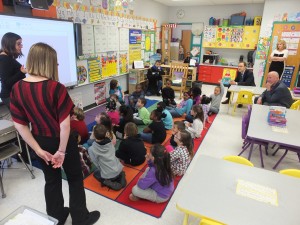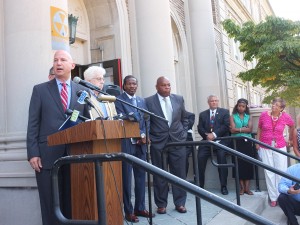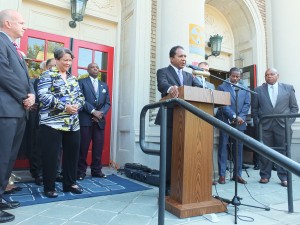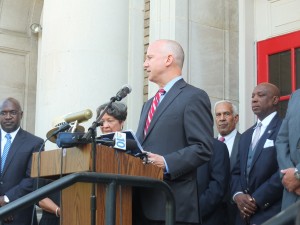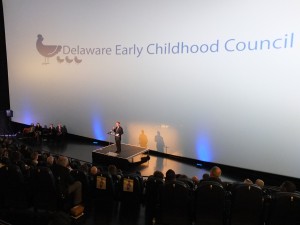Showcase how collaborative professional learning is changing Delaware classrooms
Dover, DE – Nearly 400 educators packed a large auditorium at Dover Downs Monday, April 20th to showcase how they are engaging their students more deeply in learning, using techniques and strategies they picked up by participating in the Department of Education’s rigorous, year-long professional learning experience called Common Ground.
The 2015 Bright Spots Common Ground 2.0 Celebration brought together educators from fifteen districts and eight charter schools from around the state. Common Ground was created to support educators as they transitioned to the Common Core State Standards, which are grade level expectations in English language arts and mathematics that are designed with college and career readiness in mind.
“You represent an impressive coalition of leaders dedicated to doing whatever it takes to give every Delaware student the best chance for success,” Governor Jack Markell told the group. “You have taken on the tough but important work of making the standards come to life in the classroom.”
Gov. Markell was among the governors who led the effort to create the Common Core standards, which are being used in more than 40 states. “These new standards mean nothing unless our teachers have the support they need to make them work,” he said.
Supporting Educators with Race to the Top
Common Ground provided clinics, online webinars, large-scale meetings of participants, national experts as speakers and ways for participants to collaborate. It was one of the ways the state used funds from its federal Race to the Top grant to support educators as they transition to the Common Core standards.
“Delaware is changing the way educators engage in professional learning,” Michael Watson, the DOE’s Chief Academic Officer, told the group. “We know that effective professional learning is very intensive, it’s ongoing, and 100 percent connected to practice and student outcomes. That’s what Common Ground embodies.”
In a survey conducted earlier this year, 89 percent of Common Ground teachers and principals said they were using what they had learned in the sessions to give students assignments that required them to have deeper knowledge; 86 percent said the Common Ground sessions had helped them engage students in their learning with expectations aligned with the Common Core.
Keynote speaker Steve Leinwand, a principal research analyst at American Institutes for Research and a nationally recognized leader in mathematics education, praised the way Common Ground was helping teachers make the transition to the Common Core standards.
“The expectations for teachers have really been ramped up,” Leinwand said. “The only places that I have seen consistently high-quality instruction and teaching and learning aligned to the Common Core is where there is collaborative structures and coaching. Teachers need time to interact.”
Discovering Students’ Needs
Educators at Shields Elementary School (Cape Henlopen) used formative assessment techniques learned through Common Ground to discover that their students had not mastered key mathematical concepts, even though their test scores were high. This led to a school-wide implementation of Number Talks, a program that provides students with the computational fluency to prove, reason and defend math answers in the classroom.
“It is exciting to be able to use professional development that really reaches all students,” Shields Elementary Principal Jenny Nauman said. “What we’ve been able to do is give them confidence in the classroom and the ability to share what they are thinking and follow someone else’s reasoning too.”
Nauman and a group of Shields Elementary teacher leaders presented their Number Talks findings at the 2015 National Council of Supervisors of Mathematics (NCSM) National Conference in Boston this spring.
Including Everyone in the Transition to New Standards
Bobbi Kilgore, Principal at Banneker Elementary (Milford) agreed that Common Ground has been a huge benefit to their school. In the two years that Banneker has been a part of Common Ground, not only have Common Core elements been implemented in traditional classrooms, but expressive arts teachers are also implementing curriculum changes.
“We’ve included everyone in our building in the changes we’ve made through Common Ground,” Kilgore said. “What we’re learning has taken on a culture within our school so that teachers really work together. They find out what students are really struggling with and then find a way to reach them.”
Odyssey Charter School in Wilmington is implementing more math reasoning in the classroom thanks to Common Ground. “Common Ground has led me to ask more challenging, more open-ended questions,” math teacher Vassilios Guidoglou said. “We’re getting answers you wouldn’t expect, and that’s really extending student learning to the next level.”
Intriguing Students
Math teacher Brittany Rehrig said the biggest takeaway from her Common Ground experience was learning to construct lessons that intrigue students. “When students are captivated, they’re more collaborative,” she said. “They feed off each other and have really positive communications. It’s not old-fashioned instruction that grabs their attention anymore.”
###
